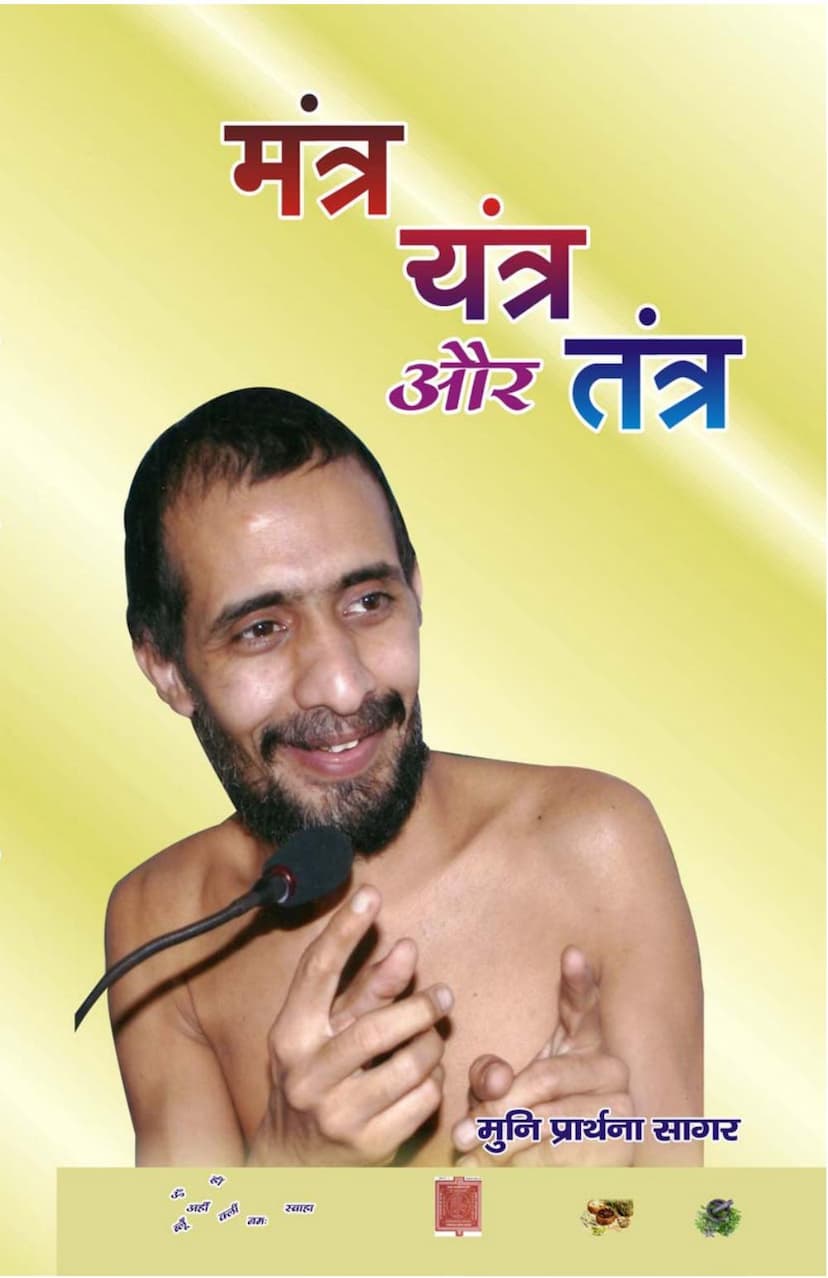Mantra Yantra Aur Tantra
Added to library: September 2, 2025

Summary
The book "Mantra Yantra aur Tantra" by Muni Prarthanasagar, published by Prarthanasagar Foundation, is a comprehensive Jain text exploring the multifaceted world of mantras, yantras, and tantras. It aims to provide guidance and solutions for individuals facing various physical, mental, economic, familial, social, and political problems by offering the power of ancient spiritual practices.
Key Themes and Content:
- Introduction to Mantra, Yantra, and Tantra: The book begins by highlighting the prevalent trend of people turning towards unscientific practices and false gurus for solutions to their problems. It positions mantras, yantras, and tantras as scientific and miraculous processes that can help achieve desired outcomes.
- Jain Tradition and Mantra-Vidya: The text emphasizes the ancient roots of mantra-vidya within Jainism, tracing its connection to the Anga Purva knowledge, specifically the "Vidyānubhavapūrva." It mentions various Jain texts and scriptures that are rich in mantra and yantra knowledge, such as the Ganadhara Valaya Mantra, Ghantakarna Kalpa, Bhaktamara Kalpa, and Namokara Mantra Kalpa.
- The Importance of Spirituality and Material Well-being: While acknowledging the ultimate goal of liberation in Jainism, the book argues for the practical necessity of worldly well-being. It suggests that a stable and comfortable material life is crucial for spiritual pursuits, as individuals suffering from poverty or illness may find it difficult to engage in self-meditation.
- The Power of Mantras: The book explains that mantras possess immense power, capable of influencing the environment and achieving specific results. It compares the focused energy of mantras to how a lens concentrates sunlight to create fire, suggesting that mantras focus mental energy to generate power.
- Components of Mantra-Vidya:
- Mantras: Defined as sentences crafted from specific impactful words, whose repeated chanting creates vibrations in the atmosphere, empowering the practitioner's intentions. The book emphasizes the importance of proper pronunciation, quantity of chanting, and the use of malas (beads), materials, directions, and rituals for mantra Siddhi (accomplishment).
- Yantras: Described as diagrams or figures created on paper, leaves, or metal, imbued with specific mantras. These are often worn as talismans for various purposes.
- Tantras: Connected to science, involving the use of specific chemical substances to create miraculous effects.
- The Science of Sounds and Bija Aksharas: The book delves into the significance of Bija Aksharas (seed syllables) like "Om," "Hrim," "Shrim," "Klim," etc., explaining their inherent power to awaken self-power or invoke deities. It highlights the origin of these Bija Aksharas from the Namokara Mantra and their role in shaping intentions and manifestations.
- The Significance of the Namokara Mantra: A substantial portion of the book is dedicated to the Namokara Mantra, emphasizing its foundational role in Jain mantra science. It details the vibrational essence of each syllable, their connection to elements and deities, and their ability to manifest various results, from health and prosperity to spiritual liberation. It also discusses the nuances of pronunciation ("Arihanta" vs. "Arhanta") and their philosophical interpretations within the Jain context.
- Mantras for Various Purposes: The book lists a vast array of mantras for specific objectives, including:
- General Well-being: Mantras for peace, happiness, prosperity, protection, and overcoming obstacles.
- Health: Mantras for various ailments like headaches, fever, digestive issues, skin diseases, etc.
- Success and Abundance: Mantras for wealth, business growth, job acquisition, victory in disputes, and fulfilling desires.
- Relationships: Mantras for marital harmony, attracting a partner, and resolving family conflicts.
- Protection: Mantras against negative energies, enemies, black magic, and accidents.
- Spiritual Growth: Mantras for self-realization and liberation.
- Yantras for Manifestation: A detailed section explores various yantras designed for specific purposes, such as achieving goals, overcoming financial difficulties, ensuring business success, resolving legal issues, and securing a happy married life.
- Tantric Practices: The book discusses tantric rituals and remedies, including specific practices for health issues, overcoming bad habits, resolving relationship problems, and achieving material or spiritual gains.
- Twelvefold Purity for Mantra Siddhi: The book outlines essential purities required for successful mantra practice: Dravya Shuddhi (purity of substance/self), Kshetra Shuddhi (purity of place), Samaya Shuddhi (purity of time), Aahara Shuddhi (purity of diet), Sambandha Shuddhi (purity of association), Asana Shuddhi (purity of seat), Vinaya Shuddhi (purity of humility), Mana Shuddhi (purity of mind), Vachana Shuddhi (purity of speech), Kaya Shuddhi (purity of body), Mantra Shuddhi (purity of mantra), and Vidhi-Vidhana Shuddhi (purity of procedure).
- Guidelines for Practitioners: The book provides detailed instructions on various aspects of mantra practice, including:
- The role and qualifications of a Guru and a disciple.
- The importance of the mala (rosary) and its types.
- The significance of directions, time, and postures in mantra chanting.
- The use of specific colors for clothing, seats, and malas according to the nature of the mantra.
- The importance of offerings (havan) and their specific ingredients.
- The method of performing rituals and obtaining mantra efficacy.
- The meaning and power of Bija Aksharas and their combinations.
- The significance of specific times, days, and lunar phases for mantra practice.
- Ethical Considerations: Muni Prarthanasagar strongly advises against the misuse of mantras for malevolent purposes, emphasizing that such practices lead to negative consequences in this life and the next. He advocates for using mantra power for the welfare of humanity and spiritual growth.
- The Importance of Faith and Guidance: The book repeatedly stresses the indispensable role of unwavering faith in mantras and the necessity of seeking guidance from a qualified Guru to avoid negative repercussions.
- Personal Experiences and Testimonials: While not explicitly detailed in the provided excerpt, the introductory notes and author's intent suggest that the knowledge shared is based on personal spiritual practice, study, and experience.
Overall, "Mantra Yantra aur Tantra" appears to be a profound and practical guide for Jains and others interested in harnessing the subtle energies of mantras, yantras, and tantras for personal betterment, spiritual progress, and overcoming worldly challenges, all within the framework of Jain philosophy and tradition.